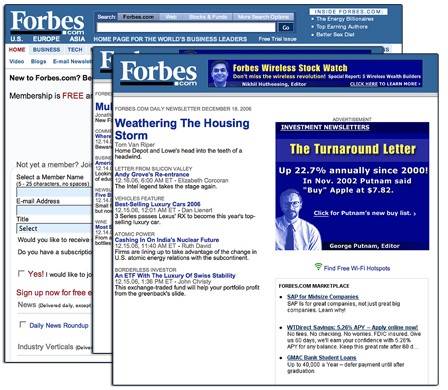Forbes Newsletters
Post on: 31 Март, 2015 No Comment

- ETFs are low cost, tax efficient ways to manage your portfolio.
In the good old days, investing primarily in the United States made sense. The U.S. produced more than half the worlds output, the U.S. dollar was king, our manufacturing base vibrant and, for the most part, the rest of the world was behind.
To use such an approach today would be a mistake.
In the last ten years, the U.S. has never been the worlds best performing stock market.
In fact, it has never ranked higher than fourth place.
- During the 1980s alone, the Europe, and Far East Index grew 27% per year compared to 16% for the S&P 500 Index.
- During the 1990s, the slowdown in Japan and the U.S. technology boom left many investors thinking they didnt need international exposure but than the S&P 500 dropped 44% in two years.
- In 2003, the S&P 500 index rebounded nicely but it was still beaten by 30 international markets. Heres a few: Sweden, up 61%, Germany, up 60%, Austria, up 54%, Spain, up 55%, India, up 75%.

Heres a shocker. During the past 25 years, a blended portfolio of 60% U.S. stocks and 40% international stocks was less volatile than a S&P 500 index fund.
Meanwhile, the U.S. has more workers in state and local government than in manufacturing, the last monthly merchandise trade surplus occurred during the Ford Administration and our budget and trade deficits together will exceed $1 trillion this year. Americas total debt now exceeds $31 trillion, more than three times our GDP.
This means the U.S. dollar will have to continue to decline in value.
Lets be blunt here. Even if you believe (as I do) that the United States is the best country in the history of the world, it makes about as much sense to invest in only one country as it does to invest in only one company or one industry.
Over the last decade, American markets have become increasingly volatile and tumultuous. The U.S. stock markets are now hypersensitive to even the smallest earnings disappointments and surprises. From the boom to bust moves of Nasdaq during dot-com fever, to the terrorism risks and corporate scandal upheavals that can jolt stocks and funds at any time, putting ones eggs in a single market even one as large as the U.S. — is no longer the most prudent and profitable path.
Recently there has tremendous growth of global investment opportunities. Building a portfolio that is globally diversified essential to reducing the overall risk of investing.
For years some of the worlds foremost investment minds have created mountains of wealth by shrewdly investing in select overseas markets. Billionaires from George Soros to Warren Buffett and John Templeton have always put a high value on seeking the best investments in markets around the world.
Did you know that an investor who put $10,000 in his Sir John Templetons flagship internationally-oriented Templeton Growth fund at its launch in 1954 would have nearly $7 million today?
Fortunately for individual investors, it has never been safer and easier to invest in overseas markets thanks to the boom in tax-efficient, low-cost ETFs (exchange-traded funds.)
Forbes is pleased to announce that it has partnered with the Chartwell Advisor Global ETF Report because it is the leading authority on exchange traded fund investing in overseas markets.
Just look at how well investors in Chartwell Advisors 4 ETF Model Portfolios have done recently:














